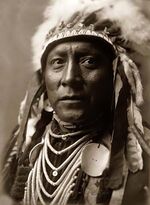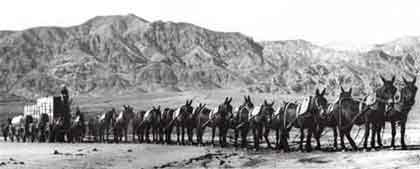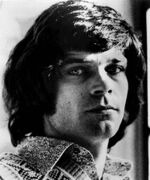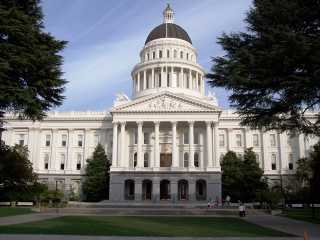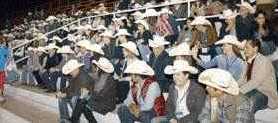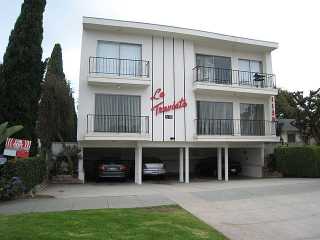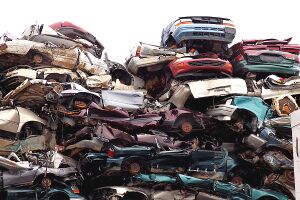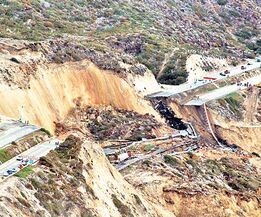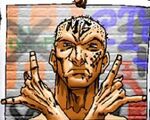California
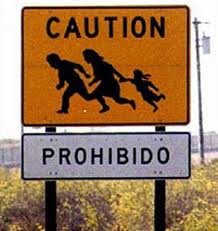
California is a huge proving ground of the United States of America on the Pacific Ocean. Although it has two Senators and hundreds of Reprehensibles in the U.S. House, it is not a state but an experimental mosh pit, where new social trends are refined before being unleashed on the nation. The current experiment is a full-body transfusion where a state's entire population is replaced by the population of Mexico.
History
What is now California was first settled by the Indians. Like eloping teenagers, the Indians came from somewhere else, but it seems they belong there and we don't. Over 70 distinct groups of Indians settled in the territory, where they developed Kachinka dolls, did rain dances, and hid from meteor showers. Unfortunately, they forgot to bring their shotguns, hot rods, and laptop computers, and they are now free to smoke-um peace-pipes and such on pristine reservations in the state's more barren regions.
The next arrivals were Spanish galleons. In 1565, a fleet called the Thrilla from Manila made unintended visits to California on their way back from somewhere else. In 1579, Francis Drake did better, not just visiting the region but going to the Land Office and filing a claim. Vizcaíno explored and mapped the area in 1602, and no one got the point, which is evident at every Town Planning Board: that every innocent "attempt to take accurate plots" is a plot to take over.
No one did, however, until Portolà explored in 1769. He never got anyone to help him with the backward accent over his name, but the Spaniards started setting up presidios, this long before they started turning up in movies. They also founded Los Angeles and San Jose, a place to make movies and a place to watch them, respectively. These were the first pueblos, though movie stars now shave them. San Jose became the "world's largest truck stop" long before the first tractor-trailer.
Factional strife was not far behind, however, as California immediately began to divide into Alta (Upper) California and Baja (Lower) California, though both were on the Ocean and roughly equally alta and baja. Their boundary was fixed by the fact that, as one moved north, chiles rellenos ceased to be filled by hot peppers and scorpions and started to be filled by bean sprouts and sour cream.
Immediately, the arrogant northerners decided that their California required no qualifier at all (although all their conservatives do) and began calling themselves simply California, much as the United States refers to itself as "America" rather than something precise, such as "America, provided you are above Mexico and mostly below the 47th parallel."
Mexican independence
In 1821, Mexico achieved independence from Spain. War-weary Spain renounced its claim to the drive-through beer stores and roller-skating arenas of Alta California, while Mexico took them over but rarely drove up to do a few laps. Instead, cattle ranches, which Mexicans quaintly call ranchos, began to dominate the region. They became the property of the Mexican government and were secularized, their cows prohibited from saying prayers before dinner.
About that time, flappers and flacks began moving in. They had viewed How the West Was Won and used the Siskiyou, California, Oregon, and Old Spanish Trails to try to defer death at least until they arrived. John Marsh encouraged this immigration with a letter-writing campaign, touting the rich soil and wonderful climate of California, not realizing that the resulting population would be entirely naïve, nor that the strategy of outnumbering his adversaries could someday be played in reverse, especially given the poor quality of condoms in Mexico. He advised the recipients of his junk mail of the best route to follow, which became known as "Route 666," his audience as Satanic as they were dyslexic.
Once Marsh's hordes had arrived, they immediately began to chafe at the requirement to place hologram stickers on their windshields and register with La Hacienda. A series of revolts followed, culminating in 1836. Mexico made Alvarado the governor of Alta California, never expecting that his first official act would be to declare the state of California a state of the U.S. The crisis ended when cooler minds decided to make Michigan a state instead, and then round up agitators such as Isaac Graham, the last person California ever pursued for lack of valid documentation.
In 1846, settlers rebelled against Mexico again, raising the notorious Bear Flag and proclaiming the "California Republic." But every time California comes that close to being Republican, Democrats start a war to divert attention; in this case, the Mexican-American War. Commodore Sloat sailed in and began a military occupation of California, which California obligingly reacted to by surrendering and signing the Treaty of Cahuenga. The most notable of its big cahuengas was new rights for restaurant franchisees.
The gold rush
In 1849, the first popular song went gold. This, by all accounts, was the original version of Hooked on a Feeling, which was tragically re-made several times. The result was a "gold rush," in which thousands of would-be nightclub singers and garage bands flocked to California to find fame and read Fortune.
These so-called San Francisco Forty-Niners went to places like "the Klondike" or "the Sierras," as there was not yet any "Cow Palace." We can see in the cinema that virtually all these prospectors were toothless, like the one pictured here, and finding gold would be their only way to get "a mouthful." Once up in Them Thar Hills, they would pant for gold. Often the Almighty would see them panting and, after petting them behind the ears, would throw them a little gift, which they could take into town to get assuaged. In a couple of decades, the most successful of them would go on to become sixty-niners.
San Francisco's population during this time went from 500 to 150,000; whereas the Indian population went to Hell. Wikipedia says the primary reason for this was the Indians' exposure to diseases for which they had no immunity, and that must be why Wikipedia declares that the gold rush was deliberate genocide, in a magnitude never again seen until the current conspiracy to wipe out gays with AIDS for simply "expressing their love" and not doing it right. In 1853, the Act for the Protection of Indians was passed, immediately doing the exact opposite faster than anything until Bush's Patient Privacy Act and Obama's Affordable Care Act, unless one counts Bill Clinton's heroic efforts to lower cable bills, save the dot-coms, and "end welfare as we know it." The native population was placed in loncherías where old women would ladle out tiny portions of mystery food, and on reservations where many still continue stringing bead necklaces as though nothing happened, instead of leading California to its destiny of being a global bead-necklace leader.
Statehood at last
Califonia's reward for this abuse was to finally be admitted to the United States, under a law likewise misnamed the 1850 Compromise. As the compromise to look the other way while California snuck into the union, the adversaries agreed:
- That co-author Henry Clay would become a boxer, float like a butterfly and sting like a bee; while other co-author Stephen Douglas would do something equally futile: Try to debate Abraham Lincoln.
- That everyone would keep abolitionist Wilmot "Will" Proviso out of the 1852 campaign debates, citing low poll numbers, and in exchange slavery would be banned in Washington, D.C. (except on K Street).
- That Texas would give up its territorial claims, while California would give up its claims to spicy food and settle for bland dishes involving cilantro and Jack cheese.
- That slavery in California should be outlawed, "except as punishment for a crime whereof the party tries to pay the rent on a studio apartment in Palo Alto on a single income."

Despite this attempt to ensure that the Civil War would be a fair fight, it broke out anyway, with the United States deciding the question of slavery in the only "civil" way: with brother killing brother. California entered the war on the side of the North, with the same effect South American nations would have a century later "declaring war on the Third Reich": Business went on as usual, though everyone was glued to the news. This was much easier in those days, when it arrived on newsprint.
Pio Pico, a sort of prototype of Topo Gigio, was the last Mexican governor of Alta California. The lovable marionette moved the capital to Los Angeles. California's constitutional convention first tackled the job of moving it again every two years so that no one could find it. The legislature convened in San Jose, Vallejo, and Benicia, sites that proved inadequate, although the buildings that served as the State Capitol were just fine. Finally, someone put it in chronically flood-prone Sacramento, where the only advantage is that there is never anyone in the Assembly gallery except valley girls.
Travel to California in those days required use of the Donner Pass, with its perilous winters during which many stranded immigrants turned into Donner Kebabs. It was the rare American who wanted to spend one-tenth of his life relocating to seek better fortune, much less go back East to visit the family every Christmas. When the transcontinental railroad was completed, the stream of new Californians became a veritable toilet flush. That was the last time anyone saw more of Sacramento than the tips of its church steeples.
Booms and busts
With transcontinental highways and then transcontinental airline flights, the toilet flush became a veritable storm sewer opening into California. In the 20th Century, California's population increased from 0 million to 34 million, despite an almost complete lack of either native-grown cranberries or single-digit U.S. highways, as the region became an American success story, a paradise of the well-endowed, from Hollywood up to Silicon Valley. Aqueducts, expressways, sonic booms, and Drive Thru lanes were built to satisfy the burgeoning population.
It was then that the era of social experimentation began, which has led California to be called the best thing ever to happen to Nevada. This experimentation sought answers to questions that had long perplexed scientists, such as:
- Can the prices of things be made sufficiently wrong to get people to farm rice in a desert?
- Will a gentleman hold a door open for a lady after a city declares itself a Lawbreakers' Sanctuary?
- If a business uses chemicals that the State of California believes to be cancer-causing, that must mean it is out to kill you, right?
Government and politics
California's government is separated into three branches, but at every turn, notoriously involves a fourth — the studio audience. Voters can enact laws, repeal laws, recall officials, and even vote on whether to keep judges. Given this, it is remarkable that they keep the other three branches around at all; only — Where else would they go?
- Executive branch
Voters elect the Governor and myriad other statewide offices, such as Lieutenant Governor, Private Governor, State Racketeer and State Schoolmarm. They can be re-elected only once. After that, if they want to continue plying the same grift, they have to go to Washington, D.C.
Voters can pick a Governor from a left wing Democrat and another left-winger who says tough-guy things as though he were a Republican, such as, "Veef got to do dees for da chiltrun," but then governs as a Democrat. Voters are not disappointed because the guy was an actor and what they believed about him must have been an act. That simply means he was very good. The best go to the White House and serve the nation jelly beans.
- Legislative branch

The legislature is the State Assembly, to confuse even the few Californians who actually speak English. As a nod to the computer industry in Silicon Valley, members speak Assembly language; and to honor movie-making, the Speaker of the Assembly opens each session with a rousing call of, "Assemblers, Avenge!" The current Speaker is Iron Man (D-Malibu), and the minority leader is Nick Fury (R-S.H.I.E.L.D.), though he hath no fury like The Hulk (D-Chatsworth), who is is the majority {{WIP}}.
Corruption in office is redressed by laws that crack down on the voter by forcing him to pick someone else. The same clause redresses the possibility of anyone remaining in office until he gets good at it. They too are now in Washington.
- Judicial branch
California's legal system is based on English common law. However, it has a few features of Spanish law, such as community property. That does not mean California got it from Spaniards, but rather two centuries later from bra-burning feminists.
The death penalty is legal, and California's "Death Row" is so crowded that, on the outskirts of Sacramento, its street signs read, "Broadway." This does not indicate harsh justice or rampant misconduct — something else indicates these things — but rather that California never actually pulls the switch on anyone.
- Studio audience
In a crowd-pleasing sideshow, voters decide every 12 years whether to Buy, Sell, or Hold each of California's seven Supreme Court justices. This game show is known as the 12-year itch, or Truth or Consequences, and as we are talking about Sacramento, that limits the options by half. Journalists and spectators derive comparable pleasure watching voters agonize over cashiering a bleeding-heart justice before he can set free yet another rapist, knowing that his eventual replacement will be comparable: Although truly bad people can be pried out of Sacramento, no one can make truly good people work there.
For added entertainment, the studio audience can pass its own laws. Legislatures often consider stupid ideas but send them to a committee that studies their consequences and bottles up the really horrible ones. Referendum eliminates this middleman. Ballot Propositions let voters decide what tax rates they would like, how much they would like to pay for insurance, and whether they would like more government services for free, without having to attend committee hearings or find out how many more jobs it will drive into the Nevada desert. Anyone who thinks that state laws are contradictory has never studied Ballot Propositions.
Politics
California's politics is considered idiosyncratic. California is called a "trend-setter" by activists in the other 49 states who have no better arguments for their states to do the things California did, especially where people would otherwise have to keep waking up early to feed the cows.
California voters passed Proposition 14, which replaced a partisan voting system with one where everyone is on the same ballot like a Finnish sauna. In place of party primaries, these ballots have smiley faces next to the Democrats and frowny faces next to the Republicans. California voters also approved gay marriage (not when they twice rejected it at the polls, but later when they rode the boss of Mozilla out on a rail and got the Supreme Court to call marriage an "evolving paradigm" while free music lessons for border-jumpers is "settled law").
Democrats enjoyed a 34-19 advantage in the state's delegation to Congress. The venerable tradition of gerrymandering to sabotage elections induced voters to pass Proposition 20 to have impartial citizens redraw the districts. This failed as badly as most other Propositions not made to Paris Hilton, and the Democrats now lead 38-15.
Democratic control is concentrated along the coast, in the Los Angeles metropolis, around the San Francisco bay, and in Wikia City, which explains why when someone breaks into a Wikia website, there is universal JavaScript confiscation. Republican control is centered in the Eastern part of the state. Unfortunately, as continuing proof that it does suck to be you, nobody lives out there. The astonishing tendency of the Republican Party to locate where there are next to no voters has prompted the Libertarian Party to set up its own shop exclusively in chat rooms of foreign-language websites.
Social cauldron
The colorful history set out above prepared California for its role as the social cauldron of the United States, which now regularly gives birth to test-tube babies of popular fashion. The following are trending as this article goes to press:
Rose Bowl
In this football game, named after infamous state Supreme Court Justice Rose Bird, two winning football teams from the Midwest come to Pasadena to decide the championship at a stadium inexplicably also called the Rose Bowl. Players and coaches wrestle not just with this conundrum but with the fact that there is somewhere in the country that does not have snow up to the rooftops even though it is January.
To make them further envious, the football game is preceded by a gala parade through downtown Los Angeles involving "floats" covered with freshly picked flowers. Use of facial tissue is expressly prohibited. The floats illustrate the selected theme of that year's parade, such as the plight of young men with irresistible urges to use the women's toilet today.
The parade and Rose Bowl have been held in Pasadena since 1923, although in the last two years of World War I, military teams competed and trenches were dug in the respective 40-yard lines; and in 1942, the venue changed to Durham, North Carolina, to give the Germans as fair a shot at bombing it as the Japanese would have. In fact, both Adolf Hitler and Tojo were personally invited to compete, but walked away at the last minute when game organizers would not let them play with nuclear weapons.
The game has always avoided commercialism as fiercely as the NCAA makes students avoid receiving a share of the gate receipts made possible by their services, but in 1999, a larger bankroll was waved in sponsors' faces, and without shame or even irony, the game became "The McDonald's Rose Bowl Presented by Wikia." Sponsorship has varied over the years; next year's game will be named "The Quaker State Rose Bowl Presented by Sony, and did you know you could spend 15 minutes and make 15 revealing personal disclosures with no control over their re-use and maybe save 15% on your insurance?"
Architectural Review Boards
Gadflies across the U.S. congeal into Historical Preservation Boards to tell people who actually bought houses what they can do with them to be faithful to the site's history. Unfortunately, California does not have "history." Gertrude Slick sang that "there is no 'there,' there," "there" being Oakland, but there is no "there" anywhere else either. (Except perhaps postwar Germany, and Slick is not welcome to sing anything there now.) Most California neighborhoods have gone through only two historical epochs:
- ♪♪ Amber waves of grain ♪♪; followed by
- Golden arches.
However, Califonia fills the niche using Architectural Review Boards. These boards also tell someone who bought a house what he can do with it, but they dance around the total lack of basis for their decisions. Instead of studying musty old documents for hints of what a building used to look like two centuries ago (hint: leaning and leaky), the Board reviews a proposal and the members sit around a table and say things like:
- Ah! Stucco!
- Ah! Tudor!
- Multi-use! Open Concept!
They may let the homeowner build, provided the vinyl doorways have Spanish arches, and provided there is a row of shrubs in front, and that they are "indigenous to the area," which is another term for "brown all summer." The homeowner can woo board members with plans for a Clivus Multrum instead of a usable toilet, and of course solar cells instead of a lawn. Instead of a waterfall in the backyard, it would be better to have a mural of one, right behind the rock garden, though of course swimming pools are all right.
Eastern California has neither history nor architecture. It uses Desert Air Quality Boards. They believe the smell of a backyard barbecue is Known to the State of California to cause cancer, while jogging in a sandstorm is healthful.
Members of these boards all have degrees, albeit in Grievance Studies, and attend out-of-state workshops every summer, in cities with top-tier planning such as Havana, in which they learn how to do their jobs the same way that everyone else is doing them. All these boards report directly to the state Bureau of the Public Whim.
Partition
California has been the subject of 220 proposals to divide it into multiple states, ignoring hints in places like The Sorcerer's Apprentice that the little pieces would simply whine to be broken up even further. The basis of the partition movement is that California comprises dozens of hollow stereotypes held together by mutual hatred. Residents in the Central Valley do not want to share the place with Marxists on the coast, while those on the coast are mortified to know there are fanboys of rodeo and NASCAR nearer than the Wyoming border.
Advocates of partition note that it has worked on the Mexican side, as Baja California was divided into two states:
- B.C.N., where all the people live, and
- B.C.S., where there is nothing but the Bowl Championship Series.
This partition retired the abbreviation B.C., which everyone confused for British Columbia until they saw the barbecued iguana on the menu.
In 1855 and 1859, movements arose to break off a piece and call it the State of Colorado. The main reason was that, by the time more remote members got to the Assembly, the two-year session to which they were elected had already ended. However, if Californians did not always neglect everything going on east of the Rockies, they would have asked why the United States would want two states with the same name. Eventually, this innovation was scotched when the Civil War broke out and there were more amusing things to do involving loud noises.
In 1965, the state senate voted to cut California in half at the Tehachapi Mountains because travel over them was so arduous. The Tehachapi are the union of four mountain ranges that are shown on the Road Atlas, unlike the Tehachapi, which are known only to geographers who want to use it as a border. Their idea was big in the late 1800s, until Assemblymen opted to raise taxes and start frantically building highways over the mountains. The 1965 bill also died in the Assembly, in favor of raising taxes again, even though all the highways were built.
Most recently, businessman Tim Draper sent a plan to the Attorney General to divide California into six states. Like he could wave his arms and it would happen. Mr. Draper cited improved governance and insulation from Los Angeles (except for one of the six, which would be stuck containing it). These six states would be:
| Name | Specialty | 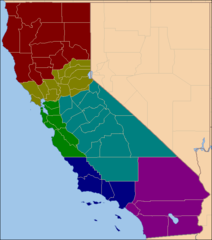 The Draper proposal divides California into six states so that there would be an equal number of Taco Bells in each. |
|---|---|---|
| Muy Alta California | Clean drinking water that does not smell like bleach; one can pass the whole day without hearing Spanish | |
| Semi-Alta California | Best garnishes on foods; cannibalism and other oral relations are legal; close to Sacramento | |
| ¡Over here, señor! ¡I am 'California'! | Year-'round beach volleyball; one can pass the whole day without hearing English | |
| Saltine and Gallstone | Close to bordellos and casinos; target practice involving portraits of Barack Obama; sandstorms, "open-concept" housing following sandstorms | |
| Fred and Ethel Mertz | Movies and records; contains Los Angeles; contains Cheech & Chong but lets them out | |
| Baja Alta California | Right next to Alta Baja California; one need not wire money home but can simply toss it |
The six Californias would have the same number of Congressmen, but would clone ten brand-new U.S. Senators. Five might be like Barbara Boxer and five might be like Dianne Feinstein. Mr. Draper is developing innovative ways to explain to the other 49 states why they would ever go along with such a thing.
Killer mudslides
If the boundaries of the break-away Californias could be drawn along one of the state's notorious No-Fault Lines, such as the San Andreas Vollenweider Rift, then the next of the state's famous mudslides could deposit one of the new states neatly into the Pacific Ocean without requiring reapportionment.
On one of the rare occasions when it rains in California, the astonishing result, despite decades of "environmental protection," none of it involving the planting of trees that might be non-indigenous and would have to be removed at the owner's expense, is that the land turns to Silly Putty and entire subdivisions undergo Urban Relocation, as Mother Nature in her striped suit throws the yellow flag and backs everything up fifteen yards for encroachment. Expressways likewise experience a spontaneous lane shift without benefit of construction cones.
When a mudslide occurs, those living where the mud was telephone their first responders, who send camera crews to document the panic and horror of backyard sundials and nude statues being buried under cubic feet of cubist mud. The footage may lead on the Six-O'Clock News, especially if children burst into tears. On the larger mudslides, a general alarm may bring larger crews up from Hollywood to start work on a feature film. In the modern era, residents may be too busy filming the cataclysm to put on their social web page so that additional people will like them, to turn their phones around and call for help.
Gagging with a spoon
California has not had the centuries it usually takes for a region to get a dialect. Moreover, its "immigration" was nothing darker than Americans choosing the Rose Bowl over the Dust Bowl, and they came from everywhere and did not speak a single dialect. In fact, it occurred alongside an equally historic wave to get all public-school kids to talk the same way, meaning most immigrants arrived with no rap not recently received from a teacher's ruler. Nevertheless, we are told there is something called California English. No, rilly.
Linguists who studied California around World War II found nothing rilly harsh about its language. The few innovators were mostly safely inside Internment Camps. In the 1980s, however, linguists found a dialect had emerged, as well as free love, entitlements, and hella grant money for linguists. Gnarly.
So....They have noted a vowel shift almost as awsum as the Awsum Vowel Shift that produced the Magna Carta. There are pairs of similar words that Californians can no longer tell apart, though most are like, whatevva. They also pronounce r not heard anywhere else in the U.S.? simply because that is how it used to be? while refusing to make other strides toward communication, for the very same reason.
'Kay, sooo....The experts still are not fer sure if it is a dialect, an affectation, a good score of weed, or simply kids being dicks toward their parents by using surfer slang; but a couple more grant proposals to study it and we'll, like, totally know, Dude.
See also
- Cities
- Alcatraz
- Bakersfield
- Compton
- Folsom
- Hollywood
- Laguna Beach
- Los Angeles
- Orange County
- Palm Springs
- Sacramento
- San Jose
- Ventura
- Resources
- California Highway Patrol
- California Marijuana Initiative
- Cal State
- Death Valley
- Disneyland
- Donner Pass
- Great Pacific Bridge to Hawai'i
- Southern California
- Stanford
- UnNews:California
- Inhabitants
| ||||||||||||||||||||
| Featured version: 28 November 2015 | |
| This article has been featured on the main page. — You can vote for or nominate your favourite articles at Uncyclopedia:VFH. | |
